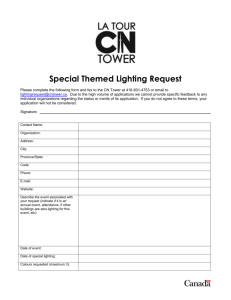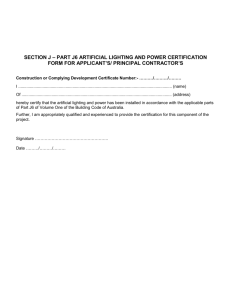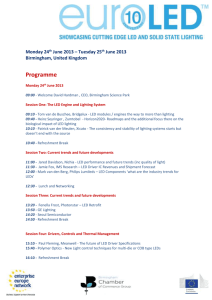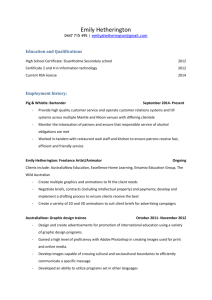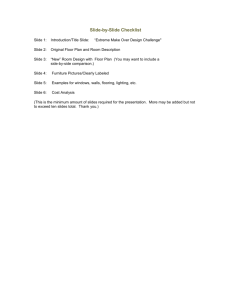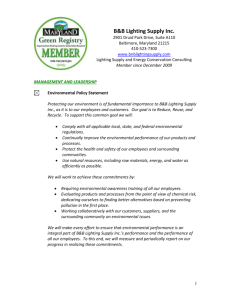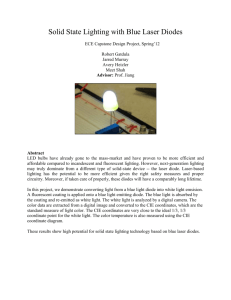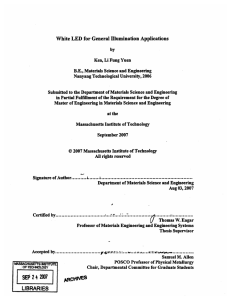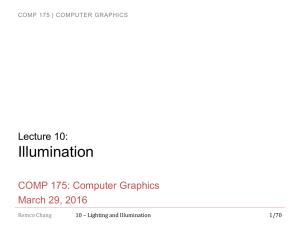Business School Presentation
advertisement
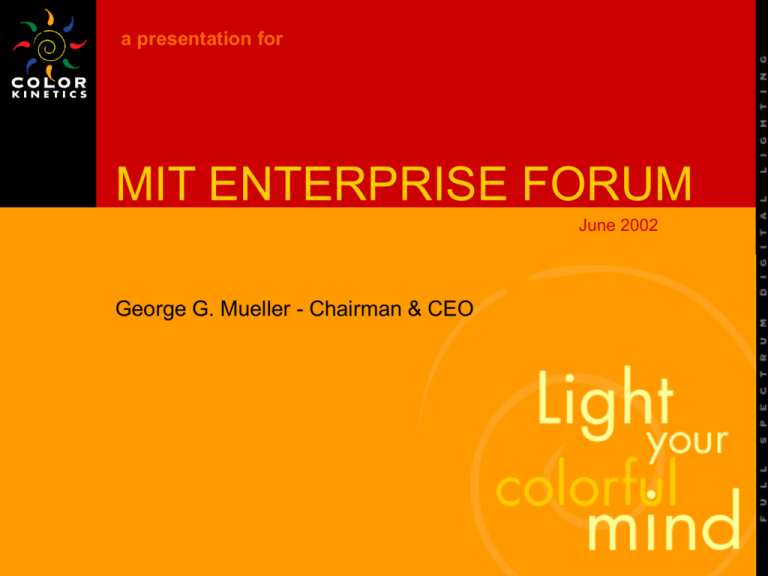
a presentation for MIT ENTERPRISE FORUM June 2002 George G. Mueller - Chairman & CEO Outline • My Background • Color Kinetics Overview • Challenges & Methods for Winning in the Marketplace My Background • 32 years old from an entrepreneurial family in Michigan • Carnegie Mellon University (CMU) Dual major in Electrical and Computer Engineering, Fine Art minor Researched in the CMU Field Robotics Center CMU Business School – left to start Internet Securities (ISI) in 1994 • ISI: 240 people in 19 countries. Acquired by Euromoney • Raised 9 rounds of private equity and venture capital ($65+M) • 5 business school case studies on ISI and Color Kinetics • 6 US Patents, over 80 filings pending A Quote… “If you had it as a kid it’s an appliance and if it was developed since then it’s technology.” Market Opportunity • US illumination (bulb, tube and fixture) market estimated to grow from $22 billion in 2000 to $26 billion in 2005 • In addition, ancillary markets such as power supplies and controllers also represent multi-billion dollar markets • Rapid market penetration* 20% of all illumination by 2010 90% of all illumination by 2020 * Source: Arthur D. Little study for U.S. Department of Energy Color Kinetics • Founded in 1997; Leader in Intelligent Solid State Illumination Technologies • Creator of Chromacore® a patented technology which generates millions of colors and colored lighting effects via microprocessor-controlled red, green and blue LEDs • Dominant intellectual property position 8 US Patents; 80+ filings pending • Provide products and solutions to market through own brand, private label, OEM and licensing • $48M in private equity financing • Projected 2002 revenues of $30+ million Color Kinetics–Technology • • Key benefits of our technology include: Microprocessor controlled intelligence Simple networking of illumination systems Easy reproduction of Color (>16.7 million colors) Based on LED technology: 100,000 hours source life 11.4 years of use Low power consumption Lower energy costs Low heat output No heat damage No moving parts Virtually no maintenance No UV emissions Safe for artwork and fabrics Core Markets • Initially targeted Theater & Entertainment • Later moved into Retail & Visual Merchandising • Recently entered Commercial & Residential Architecture, Consumer Products and OEM Winning in the Marketplace • CK Customers: Disney, Saks Fifth Avenue, Sony Loews, Nine West, Macy’s, NYS Bridge Authority, Ernst & Young, W Hotels, Rainforest Café, Northwest Airlines, Ford, Volkswagen, Marriott Corporation, Sands Casino, Royal Caribbean, Harrah’s, Limited Too, Brookstone, Metropolitan Museum of Art, General Motors • CK Retailers: Target, Toys “R” Us, Discovery Channel Stores, Radio Shack, Spencer Gifts, National Record Mart, Martha by Mail, Newbury Comics, Electronics Boutique, REI, Sam Goody, Longs Drugs • CK Awards: Smithsonian – Permanent Exhibit 2002 MIT Tech Review TR100 D&T New England Fast 50 – Rising Star Finalist, E&Y Entrepreneur of the Year CK’s Future • World-wide Lighting Market = $40 B to $60 B. • Electric lighting consumes about 20% of the electricity used in US buildings. (2001: US Department of Energy) • Solid State Lighting can create a new lighting industry of over $50 B/year worldwide. (2001: Optoelectronics Industry Development Association Tech Roadmaps) • Estimated that by 2025 SSL could reduce the global amount of electricity used for lighting by 50%. (2001: Optoelectronics Industry Development Association Tech Roadmaps) History of Lighting Innovation • Between 1800 – 1992, there has been a 900x decrease in the cost of light.1 Major shifts have occurred with the introduction of new, disruptive technologies that replaced incumbent technologies. • Over the last 4 decades, there has been a 1,000x increase in the output (in lumens) of LEDs. • Flux per package increased at 30x/decade, cost/lumen decreased at 10x/decade.2 This trend is accelerating! Cost Of Light Cost of Light $28 $ Per M illion Lum en-Hours $30 $25 $25 $23 $20 $15 $10 $5 $5 $LEDs Halogen Incandescent • LED Fixture Assumptions: 500 lumens, 48W, 75K hour life & MSRP $300 • Fluorescent does not include ballast costs • For All: $0.10/kWh and $15 per hour replacement labor Fluorescent Projected Cost of Light $50 $ Per M illion Lum en-Hours $45 $40 $35 $30 x $25 Inca ndescent x Ha logen $20 $15 $10 Fluorescent x $5 $2001 2002 2003 2004 2005 2006 • Gas & Glass bulbs only without ballasts and fixtures • LEDs performance and price as per trends & 75k hour life. • $0.10/kWh and $15 per hour replacement labor 2007 2008 2009 Developing a niche in a market with significant competition • Color Kinetics competes in a big industry with billion $ players. (GE, Philips, Osram Sylvania) • Lighting is a commodity market – it’s slow and boring with little technology advancement. It’s filled with “Brass, Gas and Glass” companies. • Speed is imperative. • Intellectual property is key. Own the future market space. • Start in a market segment where the industry giants are least likely to go and with customers that they can afford to lose. Marketing a Disruptive Technology • Revolutionary change = opportunity • Disruptive technologies are discredited by the professionals, therefore education is imperative. You have to become an evangelist and educate the market through intensive marketing efforts. Tradeshows, seminars, press. • “Cross the chasm” in a market where there are early adopters who will buy your beta technology. Listen to the early adopters for product feedback and guidance. Latch on to “champions” assist them in communicating to the market. Get industry professionals talking: Influence the influencers. Sales and Positioning Challenges • Focus on smaller market segments where you can learn and make mistakes, then leverage successes to enter new markets. • Start with a direct sales approach as only you and your company know and are passionate enough to bring to market something new. • For a totally new technology, market education is key Re-define the rules / metrics of competitive comparison People resist change. Customers resist change. It’s human nature to say “no” first. Educate customers to “yes”. Summary • • Solid State Lighting (SSL) Breakthrough technology in the lighting market Disruptive technology Color Kinetics is leading the way Selling and Marketing a Disruptive Technology Professionals discredit new technologies Market Focus Education Direct Sales Intellectual Property Entrepreneurial Speed Here’s to a bright & colorful future! “Success is getting what you want, but happiness is wanting what you get.” Thank You!
